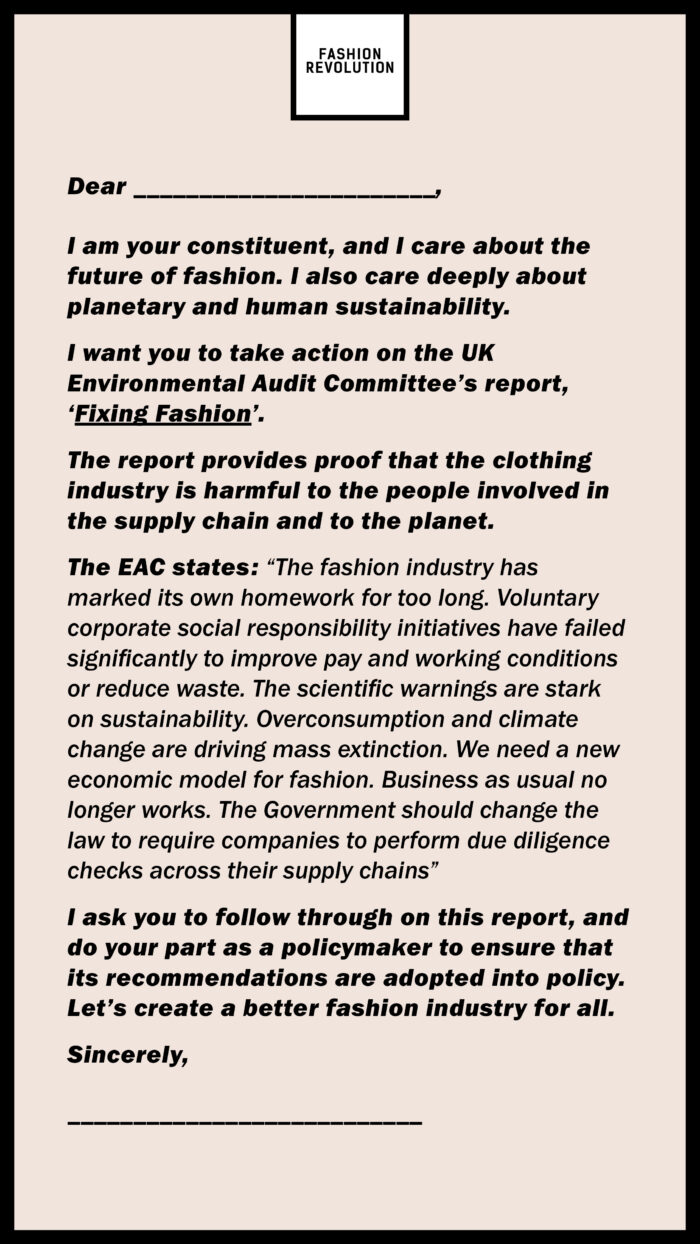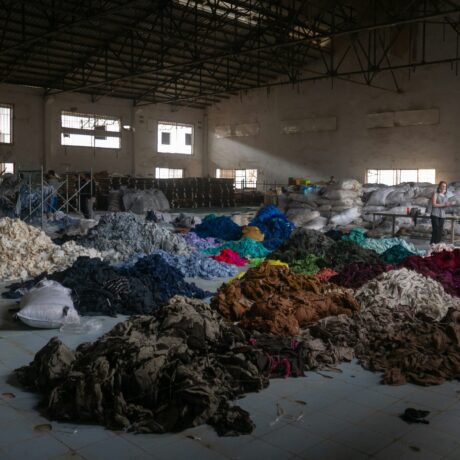The UK government response to the Fixing Fashion report lacks action.
In February 2019, the UK Government’s Environmental Audit Committee published Fixing Fashion, their report on the sustainability of the UK fashion industry. The report included evidence from leading fashion retailers as well as supply chain and environmental experts, including evidence from Fashion Revolution (You can read the evidence we submitted here).
Within the report were key recommendations that the UK Government should adopt into policies and legislation, to help combat the social and environmental abuses that occur as a result of the way clothing is made, sold and discarded (read more about the recommendations that were put forth here). Today, the Government published its official response.
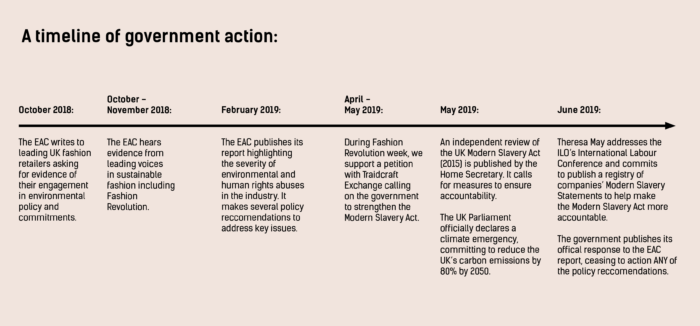
What does this mean?
The report was sent to UK Ministers, who considered the recommendations put forward by MPs on the Environmental Audit Committee, deciding whether or not to turn these into concrete policy and legislation.
This process is how other environmental victories, such as the banning of microbeads in cosmetic products, have come into effect.
What was the verdict?
Negative. Ministers essentially rejected each and every recommendation in the report, often citing alternatives courses of action for the issues in question, without committing to any tangible policies. From environmental issues like synthetic clothing in landfill to human rights abuses such as the illegal and abominably low pay that is commonplace in some UK garment factories, the Government’s official response is sympathetic but passive.
For example, one recommendation highlights the important work of the voluntary action agreement, SCAP (Sustainable Clothing Action Plan), which says lack of government funding is a barrier for the program in getting brands to sign on. The report requests that SCAP receive more public funding.
In reply, Parliament outlines, “We envisage that Government will continue to provide support for the SCAP which is currently part funded by signatories, with contributions calculated according to organisation size, once the current phase of action ends in 2020. Planning is beginning on the work of SCAP post-2020 and Government will work with WRAP and SCAP members in developing future plans. The recommendations of the Committee will be taken into account.”
It is this kind of supportive but vague language that characterises most of the government response. So while the Government appears to be concerned and engaged, they have rejected virtually all of the report’s recommendations.
Report author and MP, Mary Creagh, has responded by saying, “The Government is out of step with the public who are shocked by the fact that we are sending 300,000 tonnes of clothes a year to incineration or landfill. Ministers have failed to recognise that urgent action must be taken to change the fast fashion business model which produces cheap clothes that cost the earth.”
In fact, this response to the report seems out of character with current political climate as the UK Parliament declared a climate emergency less than 2 months ago.
On the human rights front, the government’s shortfall in commitment is equally confusing, in the wake of a recent review of the Modern Slavery Act, alongside Theresa May’s commitment to improve it, which she announced last week at the International Labour Conference.
In the Fixing Fashion report, human rights abuses were particularly highlighted in Leicester, where journalist Sarah O’Connor noted that, “The going rate for a garment worker in lots of places in Leicester is £3.50, £4 an hour”. Addressing this, the government rejects the policy recommendations and cites programmes already in place to address UK labour abuses. This does not, however, explain how the government will actually remediate the labour abuses in the garment industry that are currently taking place.
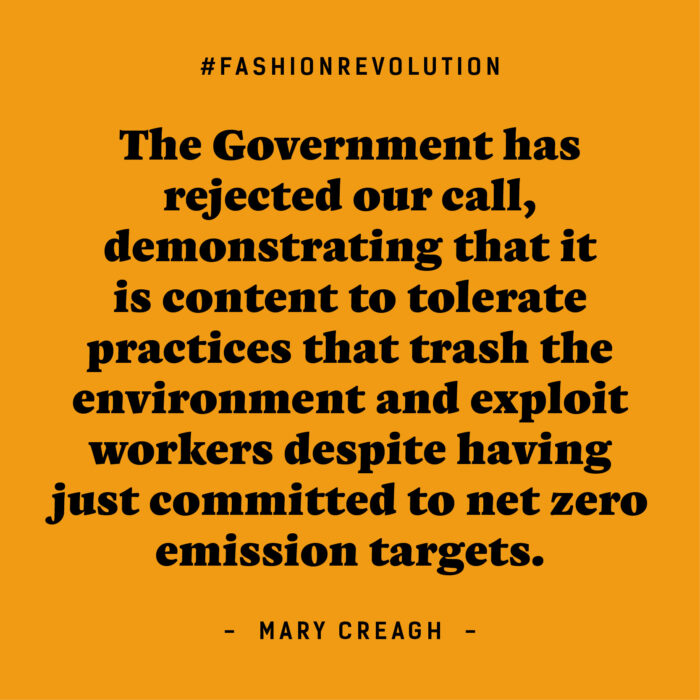
So, what’s the message?
The official response sends a clear message that the government doesn’t take the fashion industry seriously. Despite its huge importance to the economy, employing many people from farm to manufacturing to retail and having an enormous environmental impact, particularly when it comes to pollution of our seas and drinking water. It is estimated that at least 9.4 trillion microplastic fibres could be released per week in the UK from our clothing (National Federation of Women’s Institutes, 2018).
How should we respond?
Even to the well-informed, this government response is difficult to make sense of. The reply to almost every recommendation continually points to other government bodies and action groups, as if to say, “don’t worry we’re looking at this elsewhere, we might do something about it someday, or maybe we won’t.”
As taxpayers, we should be frustrated because we are basically being told that our hard-earned coins are paying for multiple all-party parliamentary groups, who have much less political influence, to be looking at the same issues, only so they can each be told that someone else is taking care of it.
Even more so, as citizens, we should be concerned. Because the government response is really saying a whole lot of nothing. They are saying, “we feel you, but we won’t put in the policy implementation to prove it.” Rather than take real responsibility, the government is simply suggesting non-binding, voluntary measures with little accountability. This is despite the fact that citizens expect the UK government to do more. Fashion Revolution’s recent consumer research shows that 63% of UK consumers agree that the government has an important role to play in ensuring that the clothing we buy is made sustainably.
In an age of climate breakdown, intangible support that lacks legislation isn’t going to save us. The UK should be a leader in environmental and social stewardship, in this country and in countries with which it trades. As a nation that has at, one time, colonised many of the countries we source clothing and textiles from today, it is shameful that the government won’t step up and act in the interest of the people who make our clothes.
Yet, as a movement, Fashion Revolution is proof that citizens care and that our voices matter. So today we encourage you to tweet, write, call or email your elected officials. If we truly want to turn around the climate catastrophe and end human rights abuses happening in fashion, like modern slavery, the government must play an active role. So, let’s demand our MPs tell us why we aren’t seeing legislation. You can use our template below if you’d like to make your voice heard.
Twitter Template:
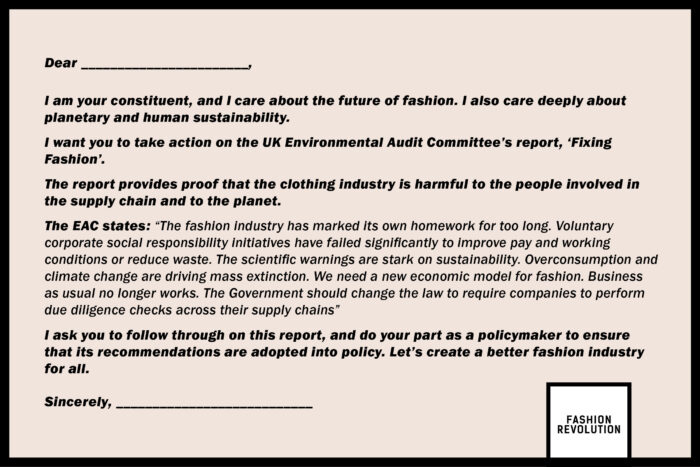
Instagram Templates:
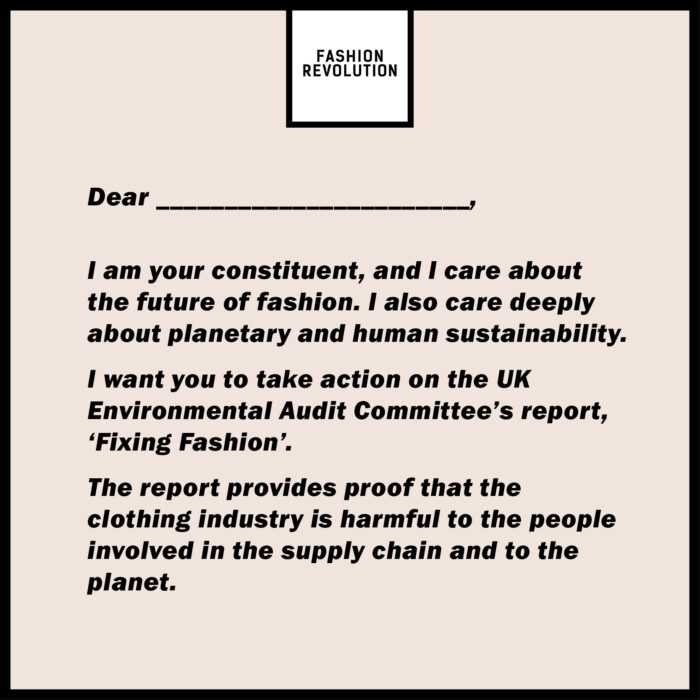
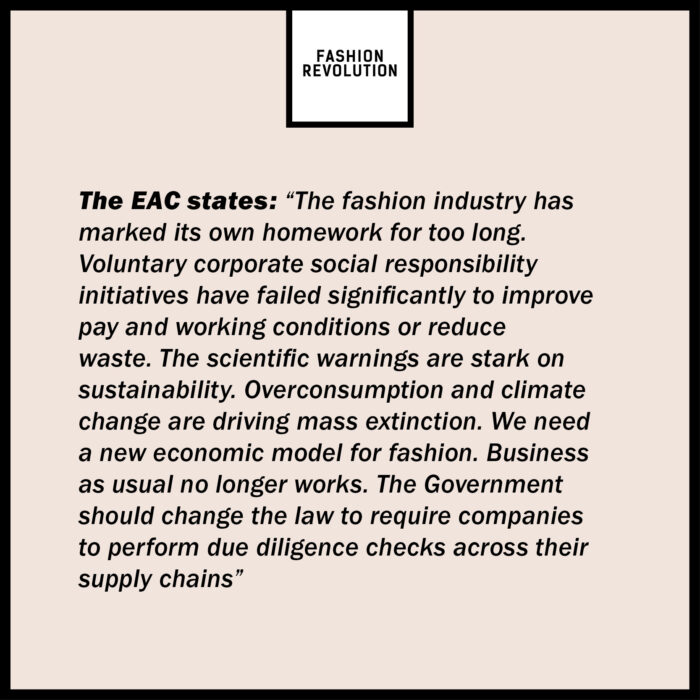
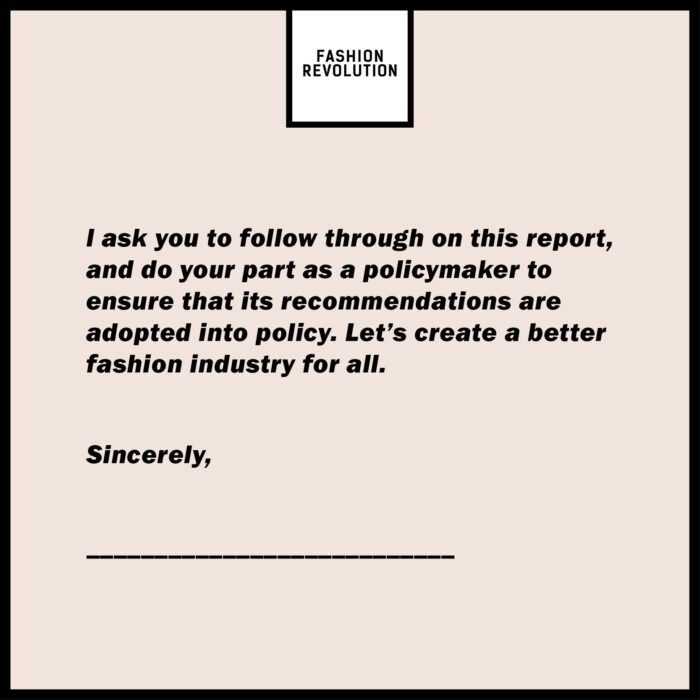
Instagram Story Template:
